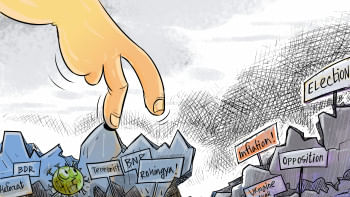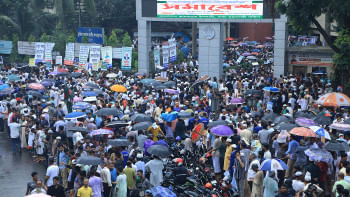A hazy pre-election atmosphere

Eid has always been a singular occasion for mass campaigns. Aspiring electoral candidates seize the opportunity to meet their voters in their constituencies amid festivities. And given the tradition of long campaigns leading up to national elections, it would not have been unusual to see candidates gearing up for their outreach programmes during the holidays as this Eid was the last time that candidates would find most of their voters home en masse.
But the hype has been absent. Other than a few pre-recorded voice messages that elicited little more than irritation, the initiatives taken this time paled in comparison to the previous occasions. Although not a voter in either district, this correspondent received two messages from the lawmakers of Sirajganj and Lakshmipur. As such, one could say that attempts to reach out to the electorate this time have been quite insignificant.
On the other front, the BNP has already made it clear that it would not join the upcoming parliamentary election under the incumbent government. The ruling Awami League has also made it clear that the election would be held according to the constitution, meaning it would not step down. This sort of uncertainty is not new in Bangladeshi politics where parties appear to be entrenched in their positions due to mistrust. On the last two occasions, the government proceeded with the elections regardless of BNP's position or protests. This time, however, it seems different.
The Awami League appeared to be more sure-footed about the elections and did not appear to mind so much that the BNP might not join the elections. But things may have changed since the evening of May 24, when it was announced that the United States would restrict visas to any Bangladeshi citizens believed to be responsible for or complicit in undermining democratic election processes in the country.
Initially, the announcement was warmly welcomed all around – by the ruling Awami League, Jatiya Party, main opposition in parliament, and BNP, main opposition camp on the streets. Arch-rivals Awami League and BNP both claimed that the measure was aimed at the other and that they had nothing to worry about. Shortly, however, the ruling party distanced itself from that position, especially with the ruling party leaders vocally protesting the measure as nothing but an attempt to oust the incumbent government.
Through its visa restrictions, the US has made it clear that it wants to see a free and fair election in Bangladesh and that basic freedoms and rights needed for a democratic environment are upheld. This announcement, in a way, seemed inevitable if one considers that Bangladesh was not even invited to the democracy summits for two consecutive times. The latest measure might be a planned attempt to pressure the government to ensure a free and fair election at the end of this year.
Eid is over and people are returning to the cities. BNP has already warned that it would go for its one-point movement to materialise the demand for an election under a non-partisan interim government. A three-member high-powered US delegation is also expected to visit Bangladesh later in July. Media reports suggest that the US officials are likely to hold talks with political parties and civil society members.
What's even more interesting is that when the ruling party members started criticising the US, Bangladesh's development partner China came up with a statement following a question-and-answer session of the Chinese foreign ministry. Without directly mentioning the US, the Chinese statement said "a certain country has long been interfering in the internal affairs of Bangladesh and many other developing countries under the pretext of democracy and human rights."
The statement further read, "We firmly support Bangladesh in safeguarding its sovereignty, independence and territorial integrity, upholding independent domestic and foreign policies, and pursuing a development path that suits its national realities. We stand ready to work together with Bangladesh and other countries to oppose all forms of hegemonism and power politics, uphold the UN-centred international system, the international order underpinned by international law and the basic norms governing international relations based on the purposes and principles of the UN Charter, and build a community with a shared future for mankind."
This reaction clearly indicates that rivalry between China and the US has now touched upon Bangladesh. This is a rather ominous sign, especially when our foreign policy is "friendship to all, malice to none."
While the attitude of the US and China regarding the next general election in Bangladesh may seem clear, we are yet to know what India's position is. We know that our neighbour wholeheartedly supported the 2014 election in which 153 lawmakers were elected uncontested. We have also seen them support the 2018 election. India is yet to make any official comment, but various Indian media outlets have given their interpretations. Most of the explanation focuses on supporting the Awami League regime and some articles also mention what the ruling party should do. But the necessity of holding a free and fair election where people's hopes and aspirations will be projected received little attention. Obviously, India will consider its geopolitical interests, especially regarding the security situation in the Seven Sisters.
Eid is over and people are returning to the cities. BNP has already warned that it would go for its one-point movement to materialise the demand for an election under a non-partisan interim government. A three-member high-powered US delegation is also expected to visit Bangladesh later in July. Media reports suggest that the US officials are likely to hold talks with political parties and civil society members.
While we have politicians, civil society members and other stakeholders, it seems that the next election is largely dependent on the attitudes of the big powers. It seems we are waiting to see how the big powers react in the coming days. Some are criticising the US, some China, while others are expressing their reservations about India's attitude.
If any one quarter is to be held responsible for such a turn of events, it would have to be the politicians. Unfortunately, no one is talking about the main stakeholders of the election – the people. Without them, democracy will neither flourish nor be strengthened.
Mohammad Al-Masum Molla is chief reporter at The Daily Star.


 For all latest news, follow The Daily Star's Google News channel.
For all latest news, follow The Daily Star's Google News channel. 












Comments